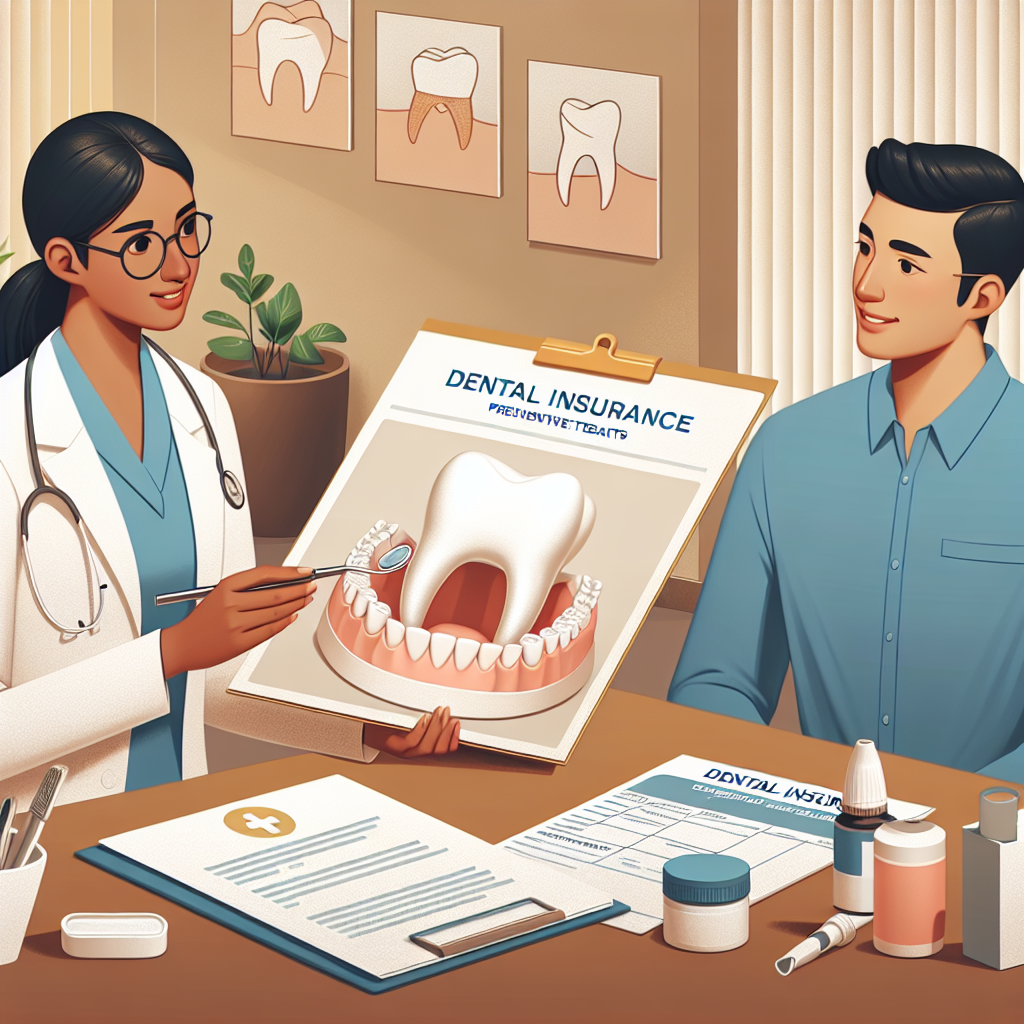In today’s fast-paced world, dental health often takes a backseat to other priorities. However, neglecting regular check-ups and preventive treatments can lead to costly and painful dental issues down the road. This is where dental insurance for preventive treatments comes in. By ensuring you have the necessary coverage for routine cleanings, exams, and other preventive measures, you can maintain good oral health and catch any potential problems early on. In this article, we will explore the importance of dental insurance for preventive treatments and how it can help you save money, time, and discomfort in the long run.
Understanding Preventive Dental Care

Preventive dental care refers to the practices and treatments that aim to maintain good oral health and prevent dental issues before they arise. It involves a series of proactive measures that individuals can take to keep their teeth and gums healthy. Understanding the significance of preventive dental care is crucial in promoting overall well-being. Here are some key points to consider:
- Definition of preventive dental care: Preventive dental care encompasses a range of habits and treatments designed to prevent dental problems rather than treat them after they occur. This includes regular dental check-ups, cleanings, fluoride treatments, sealants, and oral cancer screenings.
- Importance of preventive treatments in maintaining oral health: Preventive dental care plays a vital role in maintaining oral health by addressing issues early on, preventing them from progressing into more serious conditions. By practicing good oral hygiene habits and seeking regular preventive treatments, individuals can reduce the risk of developing cavities, gum disease, and other oral health problems.
- Common preventive dental procedures: Some common preventive dental procedures include professional cleanings to remove plaque and tartar buildup, dental exams to check for any signs of decay or disease, fluoride treatments to strengthen enamel, dental sealants to protect teeth from decay, and routine X-rays to detect any hidden issues. These procedures are essential for maintaining optimal oral health and preventing more extensive and costly treatments down the line.
Benefits of Preventive Dental Care
- Reduced risk of dental issues: Dental insurance plays a crucial role in promoting preventive dental care by covering regular check-ups, cleanings, and screenings. These routine visits help in early detection of potential dental problems such as cavities, gum disease, or oral cancer. By addressing these issues promptly, individuals can prevent more serious and costly treatments in the future.
- Cost-effectiveness in the long run: Investing in dental insurance for preventive treatments can result in significant cost savings over time. By maintaining good oral hygiene habits and attending regular dental appointments, individuals can avoid the need for extensive procedures like root canals, extractions, or dental implants. Preventive care is not only more affordable but also helps in preserving natural teeth and overall oral health.
- Improved overall health due to oral health connection: The link between oral health and overall health is well-established, with poor oral hygiene being associated with various systemic conditions such as heart disease, diabetes, and respiratory infections. Dental insurance that covers preventive treatments encourages individuals to prioritize their oral health, leading to better overall well-being. Regular dental check-ups can also help in identifying early signs of systemic diseases, contributing to early intervention and improved health outcomes.
Overview of Dental Insurance Coverage
Dental insurance serves as a crucial tool in ensuring individuals have access to necessary oral healthcare services. Understanding what dental insurance entails and the various coverage options available is essential for individuals seeking preventive treatments to maintain good oral health.
- What is dental insurance?
Dental insurance is a form of health insurance designed to help manage the costs associated with dental care. It functions similarly to other types of insurance by providing coverage for a portion of the expenses incurred for various dental procedures and treatments. - Types of dental insurance plans available
There are several types of dental insurance plans offered by insurance providers, including Preferred Provider Organizations (PPOs), Health Maintenance Organizations (HMOs), and Dental Health Maintenance Organizations (DHMOs). Each plan has its unique features, such as network restrictions, coverage limitations, and cost-sharing arrangements. - Coverage for preventive treatments in dental insurance policies
One of the key aspects of dental insurance is its coverage for preventive treatments, which are aimed at maintaining oral health and preventing more serious dental issues. Preventive treatments typically include routine dental exams, cleanings, X-rays, and fluoride treatments. Dental insurance policies often cover these preventive services at a high percentage or even fully, encouraging individuals to prioritize their oral health through regular preventive care.
Examining Coverage for Preventive Treatments
Overview of Dental Insurance Coverage
When it comes to dental insurance plans, it is crucial to delve into the specifics of coverage for preventive treatments. Understanding what is included and excluded in the policy can significantly impact an individual’s approach to maintaining their oral health. Here are some key points to consider:
- Inclusions and Exclusions in Dental Insurance Plans: Dental insurance plans vary in terms of what preventive treatments are covered. Typically, services such as routine cleanings, exams, and X-rays are included under preventive care. However, more extensive procedures like sealants or fluoride treatments may have limitations or exclusions depending on the plan.
- Co-pays and Deductibles for Preventive Services: While preventive treatments are often covered at a higher percentage by dental insurance plans, there may still be co-pays or deductibles associated with these services. It is essential for individuals to be aware of these costs to budget accordingly and make informed decisions about their oral health care.
- Importance of Understanding Coverage Details Before Seeking Treatment: Before scheduling any preventive treatments, it is crucial to review the coverage details of your dental insurance plan. By understanding what is covered, what costs may be involved, and any limitations or exclusions, individuals can proactively manage their oral health and make the most of their insurance benefits. Failure to grasp these details could lead to unexpected out-of-pocket expenses and hinder access to essential preventive care.

Maximizing Dental Insurance for Preventive Care
When it comes to maximizing dental insurance for preventive care, individuals should be aware of various strategies that can help them make the most of their coverage. By understanding how to utilize annual maximum benefits, choosing in-network providers for cost savings, and submitting claims correctly for preventive treatments, individuals can ensure they are taking full advantage of their dental insurance for maintaining good oral health.
Utilizing Annual Maximum Benefits
Maximizing annual maximum benefits is crucial for individuals looking to receive preventive dental treatments without incurring significant out-of-pocket expenses. Annual maximum benefits refer to the maximum amount of money that dental insurance will pay for covered services within a benefit period, typically a year. By scheduling preventive treatments such as cleanings, exams, and x-rays strategically throughout the year, individuals can ensure they are utilizing their annual maximum benefits effectively. This not only helps in maintaining optimal oral health but also ensures that individuals are making the most of their dental insurance coverage.
Importance of In-Network Providers for Cost Savings
Choosing in-network providers is another essential aspect of maximizing dental insurance for preventive care. In-network providers have negotiated fees with insurance companies, resulting in lower out-of-pocket costs for patients. By selecting dentists who are part of their insurance network, individuals can benefit from cost savings on preventive treatments such as cleanings, fluoride treatments, and sealants. This strategic approach not only helps in reducing expenses but also encourages individuals to prioritize preventive care, ultimately leading to better oral health outcomes in the long run.
Submitting Claims Correctly for Preventive Treatments
Submitting claims correctly for preventive treatments is key to ensuring that individuals receive the maximum coverage entitled to them under their dental insurance plan. It is essential to understand the specific preventive services covered by the insurance policy and follow the proper procedures for claim submission. By providing accurate information, including treatment codes, dates of service, and necessary documentation, individuals can expedite the claims process and avoid potential denials or delays in reimbursement. This proactive approach not only streamlines the administrative aspect of utilizing dental insurance but also helps individuals track their preventive care history for future reference and planning.
Tips for Choosing the Right Dental Insurance Plan
When selecting a dental insurance plan that prioritizes preventive treatments, there are several key factors to consider to ensure you are maximizing your coverage and benefits.
- Evaluating coverage for preventive services:
It is essential to carefully review the extent of coverage provided for preventive services such as routine cleanings, exams, and X-rays. A comprehensive plan should offer full or substantial coverage for these preventive treatments to encourage regular dental visits and early detection of issues. - Considering premiums versus coverage benefits:
While comparing different dental insurance plans, it is crucial to strike a balance between the premiums you will be paying and the coverage benefits you will receive. Opting for a plan with slightly higher premiums but more extensive coverage for preventive care may prove to be more cost-effective in the long run by reducing out-of-pocket expenses for routine treatments. - Reviewing customer satisfaction ratings and reviews:

Researching customer satisfaction ratings and reading reviews of different dental insurance providers can offer valuable insights into the quality of service, ease of claims processing, and overall customer experience. Choosing a reputable insurer with positive feedback from members can give you peace of mind knowing that you will receive prompt and reliable support for your preventive dental needs.
Common Misconceptions About Dental Insurance for Preventive Treatments
- Myth: Preventive treatments are not covered by dental insurance
Many individuals mistakenly believe that dental insurance only covers treatments for existing dental issues and emergencies, overlooking the fact that most plans include coverage for preventive services. Preventive treatments such as regular cleanings, check-ups, and X-rays are typically fully or partially covered by dental insurance plans. These services are crucial in maintaining good oral health and preventing more serious and costly dental problems in the future.
- Myth: Dental insurance is not worth the cost for preventive care
Another common misconception is that dental insurance is not a worthwhile investment for preventive care since these services are relatively affordable out-of-pocket. However, dental insurance not only helps offset the cost of preventive treatments but also encourages individuals to seek regular dental care. By having insurance coverage for preventive services, individuals are more likely to prioritize their oral health and visit the dentist regularly, leading to early detection of issues and timely intervention.
Addressing Gaps in Understanding
Dental insurance plays a crucial role in promoting preventive care by incentivizing individuals to prioritize their oral health through routine check-ups, cleanings, and screenings. Despite this, there are several misconceptions surrounding the importance of dental insurance for preventive treatments that need to be addressed to ensure individuals fully grasp the value it offers.
- Exploring the role of dental insurance in promoting preventive care:
- Dental insurance plans often cover a significant portion, if not all, of the cost associated with preventive treatments such as regular dental exams, cleanings, and X-rays. By removing financial barriers, insurance encourages individuals to seek preventive care, which can help detect issues early on and prevent more costly and invasive procedures in the future.
- Educating individuals on the long-term benefits of preventive treatments:
- Many people underestimate the impact of preventive dental care on their overall health and well-being. Regular visits to the dentist not only help maintain oral hygiene but also play a vital role in detecting systemic health issues such as diabetes and heart disease early on. Dental insurance facilitates access to these preventive services, leading to improved overall health outcomes.
- Providing resources for further information on dental insurance coverage:
- Understanding the specifics of dental insurance coverage can be daunting for many individuals. By offering resources such as informational brochures, online tools, and customer service support, insurance providers can help individuals navigate their coverage options more effectively. This, in turn, empowers individuals to make informed decisions about their oral health and utilize their benefits for preventive treatments more efficiently.
FAQs for Exploring the Importance of Dental Insurance for Preventive Treatments
What are preventive treatments covered by dental insurance?
Preventive treatments covered by dental insurance typically include routine cleanings, exams, fluoride treatments, and X-rays. These services are important for maintaining good oral health and catching any potential issues early on.
Why is dental insurance important for preventive treatments?
Dental insurance can help make preventive treatments more affordable and accessible for individuals. By having coverage for these services, individuals are more likely to stay up to date on their oral health and prevent more serious issues from developing.
Are preventive treatments usually covered at 100% by dental insurance?
Many dental insurance plans offer coverage for preventive treatments at 100%, meaning there is little to no out-of-pocket cost for individuals. This encourages individuals to prioritize their oral health and attend regular cleanings and check-ups.
What happens if I don’t have dental insurance for preventive treatments?
If you do not have dental insurance for preventive treatments, you may have to pay out of pocket for these services. This can lead to individuals skipping important visits and potentially developing more serious dental issues that could have been prevented with regular check-ups.
Can I purchase dental insurance specifically for preventive treatments?
Some dental insurance plans may offer coverage specifically for preventive treatments, while others may include it as part of their overall coverage. It’s important to research different plans and choose one that best fits your needs for preventive care.